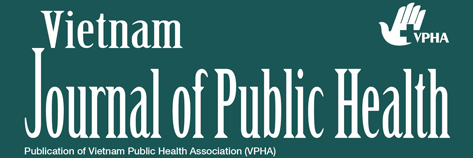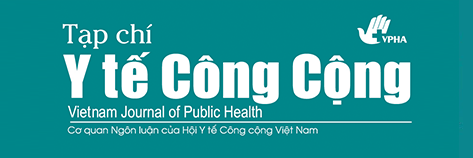Đánh giá kiến thức thực hành về làm mẹ an toàn của cô đỡ thôn bản người dân tộc thiểu số 3 năm sau đào tạo tại tỉnh Hà Giang, 2014 (Assessment of knowledge and skills on safe motherhood of ethnic minortiy midwives after 3 years of training in Ha Giang province, 2014)
Tóm tắt
Đặt vấn đề: Năm 2009-2011 tỉnh Hà Giang triển khai mô hình đào tạo cô đỡ thôn bản (CĐTB) người dân tộc thiểu số. Nghiên cứu này được thực hiện nhằm đánh giá kiến thức và thực hành về làm mẹ an toàn (LMAT) của CĐTB người dân tộc thiểu số tại Hà Giang 2 năm sau đào tạo. Phương pháp nghiên cứu: Thiết kế nghiên cứu cắt ngang, áp dụng phiếu phát vấn tự điền để đánh giá kiến thức và quan sát để đánh giá kỹ năng, đã được sử dụng trong 2 vòng đánh giá. Kết quả: Kết quả cho thấy kiến thức và thực hành của CĐTB duy trì tương đối tốt. Tuy nhiên, điểm trung bình kiến thức về tư vấn cho phụ nữ mang thai qua hai kỳ đánh giá giảm dần từ 3,12 xuống 2,80 (P<0,001) và đỡ đẻ là kỹ năng có tỷ lệ đạt thấp nhất (60%). Kỹ năng truyền thông của CĐTB còn chưa tốt. Kết luận và Khuyến nghị: Mô hình phù hợp để đào tạo CĐTB người dân tộc thiểu số. Hàng năm tỉnh Hà Giang cần tổ chức đào tạo lại và tăng cường giám sát hỗ trợ kỹ năng đỡ đẻ và truyền thông cho CĐTB, để tăng cường hiệu quả làm việc sau đào tạo.
English abstract:
Background: Under UNFPA support, the 18-month training pilot model of ethnic minority midwives (EMM) was conducted in Ha Giang from 2009 to 2011. This study aims to evaluate knowledge and skills on safe motherhood of EMM after 2 years of training in Ha Giang province. Methods: The cross-sectional design using self-administered questionnaire and direct observation methods was used in 2 rounds of evaluation in 2013 and 2014. Results: After 2 years of training and upon returning to work at their local health facilities, the knowledge and skills of EMM in Ha Giang were quite good, however, EMM knowledge mean point on counseling for pregnant women decreased gradually during the time between 2 rounds of evaluation, from 3.12 to 2.80 (P < 0.001). They were good at practical basic skills such as antenatal care, child care, post-partum bleeding management. Midwifery skills were the lowest completion rate (60%). Their communication skills are still poor. Recommendations: This model is suitable for EMM in poor economic areas. Continuing training and supportive supervision for EMM should be conducted every year by local health authority in order to strengthen work performance and effectiveness after training.
Từ khóa
Toàn văn:
PDF (English)##submission.citations##
Tiếng Việt
Bộ Y tế, Điều tra tử vong mẹ, tử vong sơ sinh ở Việt Nam 2006-2007, Hà Nội 2009
Quyết định số: 164/2006/Qđ-TTg ngày 11 tháng 7 năm 2006 của Thủ tướng Chính phủ
Bùi Thị Thu Hà, Nguyễn Thanh Hà, Lê Minh Thi, Đánh giá kiến thức, thực hành về làm mẹ an toàn của cô đỡ thôn bản người dân tộc thiểu số sau đào tạo tại 3 tỉnh Hà Giang, Ninh Thuận và Kon Tum, Tạp chí Y học thực (816) – số 4/2012
Tiếng Anh
Harvey SA1, Ayabaca P, Bucagu M, Djibrina S, Edson WN, Gbangbade S, McCaw-Binns A, Burkhalter BR, Skilled birth attendant competence: an initial assessment in four countries, and implications for the Safe Motherhood movement, Int J Gynaecol Obstet. 2004 Nov;87(2):203-10.
Harvey SA, Blandón YC, McCaw-Binns A, Sandino I, Urbina R, Rodríguez, GómezI C, Ayabaca P, Djibrina S, Are skilled birth attendants really skilled? A measurement method, some disturbing results and a potential way forward, Bulletin of the World Health Organization | October 2007, 85 (10)
M. Carlough T and M. McCall, Skilled birth attendance: What does it mean and how can it be measured? A clinical skills assessment of maternal and child health workers in Nepal, International Journal of Gynecology and Obstetrics (2005) 89, 200 —208
Vietnam Ministry of Health (2010), Situation analysis of capacity of RHC network services in Vietnam.



